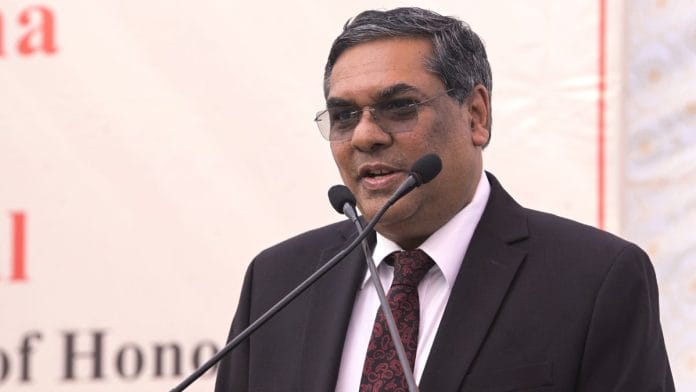New Delhi: “If you are giving fundamental rights under the Constitution, you must also give the courts the power to enforce those rights,” Chief Justice of India Sanjiv Khanna said Wednesday.
The CJI spoke on the topic “Recent Trends of the Supreme Court of India and the United States Supreme Court” at an event organised by the Society for Democratic Rights, New Delhi, in collaboration with Georgetown University Law Center, Washington, DC.
The event was moderated by senior advocate Vibha Datta Makhija and saw participation from key speakers, such as the Executive Vice-President of Georgetown University and Dean of the Law Center, William M. Treanor, and the Associate Dean of Georgetown University Law Center, Carlos M. Vázquez.
India has the most robust and unparalleled legal system, the CJI said, adding, “We have to provide access to justice, which includes ease of access and quality of justice. Nearly 80 percent of India’s population is eligible for legal aid.”
Highlighting that India’s judicial system is “unique” in many ways, the CJI elaborated on concepts like Lok Adalats, or people’s courts, which are chaired by retired judicial officers or judicial officers who provide immediate justice. “You will always see a smile on the villagers’ faces when you mention the term ‘Lok Adalat’. You won’t find such aspects anywhere else,” he said.
Khanna also spoke about how legal aid is a fundamental right under the Constitution and is spearheaded by the Indian judiciary, as opposed to other Western countries.
“All legal aid communities and authorities are headed by judicial officers in India. For instance, 8,000 lawyers are just dedicated to legal aid along with 48,000 paralegal volunteers. We also provide witness protection programmes and Lok Adalats,” he said.
Stating that the Indian criminal legal system “cannot function without legal aid”, Khanna said that even in India’s prisons, legal aid clinics are in place, where even accused persons who have defence lawyers can go in case they want a second opinion.
Comparing this with the legal aid situation in the US, Georgetown Law Centre Dean, William Treanor, recalled the 1963 case decided by the Supreme Court of the United States (SCOTUS), titled “Gideon vs Wainwright” which held that everyone has a right to legal representation when they are persecuted, including criminal defendants who are unable to afford their own attorneys.
Responding to a question by Makhija on how the top court has expanded the scope of citizens’ constitutional rights, the CJI said, “For us, the Constitution is the Bible. The right to life has been expanded to include dignity of life, the right to a better environment and a life of better quality.”
Khanna also proceeded to give examples of the National Food Security Act, 2013 and the introduction of the Economically Weaker Section (EWS) category of seats—initiatives that were brought about after the judiciary’s intervention.
“Not many of you will know that the Indian Supreme Court had directed all diesel vehicles to shift to CNG,” the CJI said recalling the 1998 directive of the apex court.
On PILs, judicial review
Elaborating on another unique aspect of India’s judiciary, Khanna spoke about the notion of Public Interest Litigations (PILs), which essentially erode locus and allow litigants to directly approach the court. “In a 2006 case, for instance, the NALSA had filed a petition for transgender rights and succeeded.”
Steering clear of commenting on cases which haven’t yet been decided, Khanna also said he won’t comment on the question of whether transgenders can be employed in government offices—a matter which is currently before a two-judge bench of the Delhi High Court.
On the question of judicial review, which refers to the court’s power to review the actions of the government and its various branches, Khanna said, “This power is vested with the high courts, Supreme Court and other constitutional courts. If you are giving fundamental rights, you must also give the courts the power to enforce those rights.”
Underlining how the court issued directions in cases related to custodial deaths and how those suggestions were incorporated into our criminal law, Khanna said, “Whenever we found there was an issue where we thought we had to step in, we interfered. From environment laws to the Vishakha judgment, or the case concerning irretrievable breakdown of marriage, we have always aimed to effectuate the rights, while maintaining the principle of separation of power”.
When asked about how the judiciary is accountable to the people, the CJI said, “We are not elected and should not be. The biggest checks on the judiciary come from the people and the bar. We speak through our judgments and are transparent.” An institution like the Supreme Court, he added, is only as good as its judges at any point of time.
(Edited by Zinnia Ray Chaudhuri)
Also read: Bar Association of India demands apology from Justice Shekhar Yadav. ‘Contrary to secularism’







Yes. The judiciary is absolutely transparent. And absolutely shameless.
The current CJI Khanna’s uncle was a Supreme Court judge. The previous CJI, Chandrachud’s father was the CJI too. Chandrachud’s son is practicing in Bombay High Court and is in line to be appointed a judge of the Bombay High Court. If things go as planned, he would end up as the CJI someday.
All of this happens transparently. The Lordships don’t bother to even hide their nepotism and corruption.
A judge through her corruption forced a man to commit suicide. Media is plastered with the name of the victim. His wife. Also with trying to malign him. No one discloses the name of the judge that indulged in this corruption. Transparency is a hoax. Shameless creatures.